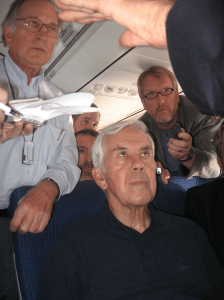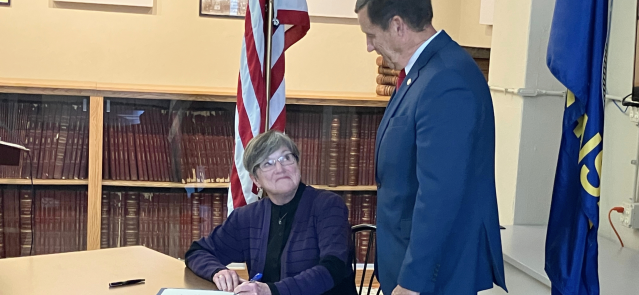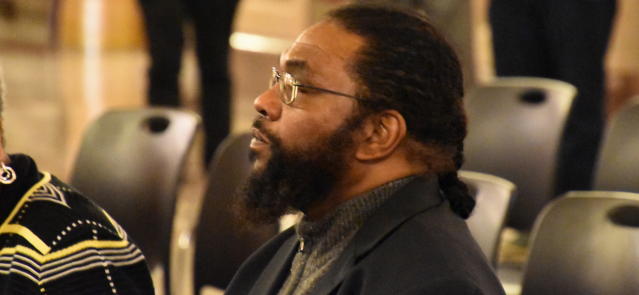Stay ahead of the curve as a political insider with deep policy analysis, daily briefings and policy-shaping tools.
Request a DemoGallego Backs Slate of Bipartisan Bills to Bring More Law Enforcement Funding to Arizona
- the Filling Public Safety Vacancies Act to provide an emergency boost to the Community Oriented Policing Services (COPS) Hiring Program, doubling the amount of federal grant funding available for local departments this fiscal year.
- the Enhancing COPS Hiring Program Grants for Local Law Enforcement Act to expand the COPS Hiring Program to allow local law enforcement agencies to utilize program grants for recruitment and retention bonuses and to allow grant applications to be valid for five years, instead of the current one year.
- the Establishing Accreditation Grants for Law Enforcement (EAGLE) Act to authorize $10 million in funding for small and mid-sized police departments to earn or renew accreditation from state, regional, tribal or national police accreditation organizations.
- the Supporting the Health and Safety of Law Enforcement Act to create a new grant program to increase coordination between community mental health centers and law enforcement officers on mental health issues, including homelessness and public safety.
- Backing the Strong Communities Act, bipartisan legislation that would build stronger relationships between police and the communities they serve by incentivizing law enforcement officers to work in the communities where they live.
- Backing the bipartisan Recruit and Retain Act to increase the recruitment of new and qualified officers by reducing application and recruiting costs associated with finding new talent.
Arizona Department of Gaming Announces Allocations for Event Wagering Licenses
Pyle puts record to the test in Republican primary vs. Eplee, Bowser
Sen. Dennis Pyle was at the center of the most contentious issue at the Statehouse over the past two years, voting to uphold Gov. Laura Kelly’s repeated tax bill vetoes before ultimately supporting the compromise lawmakers reached in June’s special session.
Pyle, R-Hiawatha, now puts his voting record to the test in a primary matchup with two well-funded Republican challengers: Rep. John Eplee, R-Atchison, and Craig Bowser.
It’s been the most expensive primary in Kansas this cycle as the candidates have spent more than $300,000 — $130,000 from Eplee, $100,000 from Bowser and $83,000 from Pyle — not to mention more than $53,000 in independent expenditures from Americans for Prosperity in support of Bowser.
Will voters in the 1st Senate District send Pyle back to Topeka for a sixth term? Or were his breaks with Republican leaders a bridge too far?
Eplee: Pyle ‘did harm to our party’
Eplee, who’s served in the House since 2017, said that he believes in term limits and that Pyle — who’s been in the Senate since 2005 after a term in the House — “fashions himself to be a career politician.”
“I think you can be there too long,” Eplee said. “I think we all have a shelf life.”
He also took issue with the senator’s party switch. Pyle changed his party affiliation to independent ahead of his 2022 gubernatorial run — a campaign where he won 2% of the vote, slightly less than Gov. Kelly’s margin of victory over Derek Schmidt.
Eplee said Pyle’s switch “did harm to our party.” This year, before filing for reelection, Pyle re-registered as a Republican.
“I don’t think that’s good when you abandon someone and then try to come back and get back involved again,” Eplee said. “It’s just not the way I think you should conduct your affairs.”
Eplee’s main focus on the campaign trail is providing more tax relief to Kansans, he said. That gives him the opportunity to contrast his stance with that of Pyle, who Eplee said stood in the way of bigger cuts.
“We wouldn’t have even had to go back in special session … were it not for the votes of Senator Pyle” and the few other Republican holdouts, Eplee said. If elected to the Senate, Eplee said, he’d support a cap on appraised value in order to lower property tax bills.
He also highlighted his support for House Bill 2001, the STAR bond legislation that aims to lure the Kansas City Chiefs and Royals to Kansas. Pyle voted no, and Americans for Prosperity — backing Bowser in the race — opposed the bill.
“At the end of the day, you have to vote your constituents,” Eplee said, “not some special interests, not Americans for Prosperity.”
While he lambasted Pyle for his longevity, Eplee had the inverse criticism of Bowser.
“He’s a newbie. We have no record,” he said. “He’s moved from district to district to get elected.”
Eplee also defended his record on two topics that could loom large in the minds of conservative voters on Aug. 6: his past support for Medicaid expansion and his 2023 opposition to a bill that would’ve banned gender affirming surgery for minors.
Eplee wouldn’t say his exact stance on Medicaid expansion but noted he voted against it in committee this year. He said he won’t vote for it until there’s a “reasonable pathway forward.”
It’s an issue that’s stagnant, Eplee said, and it won’t go anywhere anytime soon given Republican leadership’s strong opposition to expansion.
“I think Kansas will be either the last state or one of the last states to ever pass Medicaid expansion, and we may never pass it,” he said.
Eplee said attacks on his record on treatment for transgender minors aren’t easy to combat.
Citing his career as a physician, Eplee said the 2023 bill he opposed would’ve affected treatment for people outside the scope of what the bill was intended to do. But this year, he voted for a similar bill after saying it addressed his earlier concerns.
“I’m a doctor. I’m going to stick with my patients every time,” Eplee said. “So then we brought a better bill in this last session”
Bowser: Most conservative candidate ‘without a doubt’
Bowser grew up in Holton, eventually leaving for college and a career in the U.S. Army. He served in Iraq in 2004-05 and saw combat there again in 2008-09, eventually retiring at the rank of lieutenant colonel.
His military service gave him a degree of government experience, Bowser said. During his first tour in Iraq, he helped organize that country’s first elections after the fall of Saddam Hussein.
Bowser lived and worked in Manhattan, Kansas, for a while, running an agricultural school for veterans near Fort Riley. In 2020, he unsuccessfully challenged then-Democratic Sen. Tom Hawk.
Now back in Holton, where he runs a farm and a small business, Bowser has returned to the political arena. He argued he’s the lone political outsider in the 1st District race, calling both opponents career politicians.
Like Eplee, Bowser criticized Pyle’s opposition to the tax packages preferred by Republican leadership in the House and Senate. Bowser said he’d support more cuts, which he said would help fight inflation.
Pyle’s party switch and gubernatorial run have upset constituents, Bowser said. “They felt like he abandoned the voters of this district.”
He noted that Pyle doesn’t serve on any committees. Senate President Ty Masterson stripped Pyle of his assignments in 2022 for not supporting Masterson’s preferred redistricting maps prior to his leaving the party. Bowser said that leaves the district with a muted voice in the Legislature.
Bowser also criticized Eplee for his past support for Medicaid expansion and for his vote against the 2023 version of the gender affirming care ban.
Because of his opponents’ records, and his own beliefs, Bowser argued he’s the most conservative candidate in the race “without a doubt.” Even though he has never previously held elected office, Bowser said voters “should have a very clear understanding on where I stand on these issues.”
Based on his experiences, Bowser said, he’s passionate about deregulation in agriculture and support for veterans. He said he also cares about improving the foster care system, noting that he and his wife had fostered a young girl they eventually adopted early this year.
“I really think I do have the qualifications, experience and the problem solving skills necessary to do the job,” he said.
Pyle: ‘I’m running on my record’
Despite criticism from his opponents and other Republicans in the Legislature, Pyle isn’t second-guessing his decisions over the past few years.
“My voting record is for the people,” he said.
Pyle highlighted his opposition to a legislative pay raise that sees most lawmakers’ salaries nearly double to $42,000. The Legislature allowed the raise to become law this session without a vote, a mechanism created by a 2023 bill on legislative pay reform.
He also burnished his conservative bona fides, including opposition to government restrictions during the COVID-19 pandemic, Medicaid expansion and even to the 2017 tax increase that unwound much of then-Gov. Sam Brownback’s major tax cuts.
“I have a record of always fighting for the little guy,” Pyle said.
Since lawmakers passed a tax cut compromise during the special session, there’s been “plenty of finger-pointing going on,” Pyle said.
The state didn’t end up with the best tax package, Pyle said, but it brought needed relief to Kansas taxpayers — particularly through the elimination of the state income tax on Social Security, one of his longtime priorities.
“I’ve worked hard to get there, and we got it,” Pyle said about eliminating that tax. “So, you know, I’m going to crow about that.”
He framed his party switch and 2022 gubernatorial campaign as a way around the Republican establishment’s special interests, saying party leaders shut out conservative opposition to Schmidt during the primary.
Pyle said he knows there’s a target on his back, but he stands behind his “stellar” record.
“Look at the establishment and who’s backing who. …” Pyle said he tells voters. “It’s very clear that the big fat cats in Topeka are mad about not getting the big fat-cat tax cut. And Pyle helped stop those fat-cat tax cuts.”
Brett Stover is a Statehouse reporter at State Affairs Pro Kansas/Hawver’s Capitol Report. Reach him at [email protected] or on X @BrettStoverKS.
Robinson faces three challengers in bid to hold seat
Marvin Robinson II joined the Legislature in 2023, succeeding his cousin, longtime Democratic Rep. Broderick Henderson.
In less than two years since, Rep. Robinson, D-Kansas City, has all but switched parties. He regularly sides with Republicans, drawing the ire of Democrats in Topeka.
On Tuesday, the voters of House District 35 will get to weigh in on that approach.
Robinson faces a trio of challengers for his seat at the Statehouse: Wanda Brownlee Paige, Michelle Watley and Kimberly DeWitt. The primary functions as the general election in this race as no Republican is on the ballot.
Criticisms of Robinson’s tenure are similar among the three, including a lack of communication with the community — recently, the representative didn’t attend a Wyandotte County NAACP candidate forum. Robinson did not respond to multiple interview requests for this article and has rarely spoken to the press since joining the Legislature in 2023.
“If I’m challenged, I need to be able to defend why I voted that way,” Paige said. “He has no really good explanation.”
State Democratic Party Chair Jeanna Repass said she’s disappointed in Robinson’s record, which she said has seen him vote against his constituents’ interests.
“If he would like to vote party line as a Republican, I absolutely welcome that,” Repass said. “But I welcome him to do that as a Republican.”
Paige: ‘I am here for the people’
Paige didn’t mince words in her assessment of Robinson.
“He’s nuts,” she said. “That’s all I can tell you.”
Paige was born and raised in Kansas City, Kansas, where she taught at public middle schools for three decades.
After retiring in 2012, she wanted to give back to the community, she said, so Paige first worked with a local church before running for — and being elected to — the Kansas City Kansas School Board in 2017. Her current term runs until January 2026.
Her observations of Robinson’s voting record led her to set her sights on a new goal.
In a heavily Democratic district, “people expect you to vote the way we vote,” Paige said of what prompted her to run against Robinson. “We’re expecting you to support the governor, unless she’s just doing something that’s totally off the mark. … That was enough for me to say, ‘Maybe it is time that I do something.’”
Paige said that if she’s elected, she has two major priorities — property tax relief and Medicaid expansion — issues she said affect everyone.
Paige said she has faced criticism for a perceived unwillingness to compromise, partly stemming from her opposition to a $420 million bond issue requested by Kansas City Public Schools.
The proposal was too expensive and would have hurt homeowners because of increased taxes, Paige said. It ultimately failed after a public vote in May.
What sets her apart from the other two challengers, Paige said, is that she’s “here for the people” and will do whatever it takes to achieve policies that support constituents in the 35th District.
“I don’t think they have that passion and that fire for the people. …” she said of Watley and DeWitt. “They say they do, but I just question how far they’re willing to go.”
Watley: Where are Robinson’s wins?
Also from Kansas City, Kansas, Watley brings an extensive political background to the race.
Her political path started shortly after high school when she worked as a carpenter and joined her local union branch. Watley said that experience gave her a strong work ethic and an appreciation for workers’ rights.
Watley has since worked for the Kansas American Civil Liberties Union, for Democratic former Missouri Secretary of State Jason Kander and on Missouri Democrat Chris Koster’s 2016 gubernatorial campaign.
After that, she founded Shirley’s Kitchen Cabinet, a Kansas City-area nonprofit “dedicated to amplifying the voices and power of Black women through education and advocacy.”
But Watley said she discovered through her work with the nonprofit that the Wyandotte County-based 35th District “didn’t have a strong advocate advocating for the money, the resources and the policy needs” that her district could benefit from, she said. “So that’s what compelled me to run.”
Beyond the partisan ramifications of Robinson’s votes, Watley said, voters in the district deserve a representative who produces tangible results.
“What can the current representative show that he’s been able to deliver or win for this district?” Watley asked.
Although Robinson is known for his advocacy for the Quindaro Ruins — a historical site that served in the 1850s and 1860s as a key stop on the Underground Railroad — his legislative strategy hasn’t led to increased funding. Instead, the governor in 2023 vetoed a $250,000 appropriation for the site after Robinson joined with Republicans to override multiple vetoes.
Property tax relief is a central part of Watley’s campaign; she noted in particular the burden faced by retired homeowners. Another key area Watley wants to address is economic development, along with maternal health, mental health and expanding health care coverage.
“How do we bring jobs back to the district?” she said. “How do we bring companies to the district? How do we support small businesses?”
Watley led Vermont Sen. Bernie Sanders’ outreach to Black voters during his 2016 campaign. But she wouldn’t say whether her approach in Topeka would be a progressive or centrist one.
Voters in the district have disparate views on issues including guns and LGBTQ+ rights, Watley said. She added that her personal beliefs “are what they are” and that she’ll “put those aside to be the vehicle and voice for the community.”
Black lawmakers should be able to vote the way their constituents want without being labeled disloyal to the party, Watley said. All four candidates in the race are Black.
“Unbeknownst to most people, Black people are not a monolith, and people of color are not a monolith, and diverse communities are not a monolith,” she said. “The values that are important to these communities don’t always align with Democrat values.”
DeWitt: ‘Active advocate’ for KCK
DeWitt called herself a lifelong resident of the 35th District and said that while she’s had opportunities to move elsewhere, she’s stayed because of the potential of Kansas City, Kansas, “to do bigger and better things.”
With a background in information technology, she founded DeWitt Consultancy Partners, the company she leads as CEO. To support and expand Kansas City-area businesses like hers, DeWitt said, “the politics of our state and the politics of our district need to be better.”
In 2016, DeWitt earned 38.5% of the vote in a failed primary challenge against Henderson, who she said simply voted the Democratic Party line without achieving results for the district. She characterized Robinson’s record as an inverse but still a continuation of three decades of failed leadership.
“Our representatives have done very little for our district,” DeWitt said. “So why I’m running is to reestablish what it means to be a representative in our district, both here locally in the district as well as in Topeka.”
DeWitt said she would be an active advocate for the district and reestablish a relationship with party leaders in Topeka. She said the area has likely missed out on economic development opportunities because of Robinson’s rift with other Democrats.
This election is an opportunity for a transformation of how the district approaches politics, DeWitt said, an opportunity to pass the torch to younger leaders.
“We need that next generation, which is my generation, to step up and start taking ownership of our environment, of our community and of those legislative priorities,” she said.
DeWitt described herself as a progressive Democrat but also a “purple coalition builder.” She highlighted her support for LGBTQ+ rights and said society “is no longer just a group of evangelical churchgoing people.”
On policy, DeWitt is focused on improving health care — both by expanding Medicaid and by ensuring services are available in the district — and economic development, areas where she believes the district has been underrepresented amid investment in other metropolitan areas.
“We need to be doing more for small businesses,” DeWitt said. “We need to be doing more to advocate for investment in our district. That can happen in Topeka.”
Democrats dismiss vote splitting fears
A four-way primary — the only Aug. 6 contest with at least that many candidates — might lead some Democrats to worry Robinson could eke out a win with only a plurality of the vote.
But Repass isn’t concerned about vote splitting, telling State Affairs that “it won’t happen” based on her on-the-ground knowledge of Wyandotte County.
“There will be people who vote for each of those candidates, and there are candidates who are putting up a strong case to the constituency there,” Repass said. “I believe they [the challengers] are going to do very well.”
Paige filed for the 35th District seat in early January, while DeWitt and Watley filed shortly before the June 3 deadline.
“It’ll be some iffy [moments], but I just got faith and confidence that I believe I can beat them,” Paige said, “and I believe we’re going to get him [Robinson] out.”
Concerns about a split vote allowing Robinson to retain his seat are based on the idea that the district’s voters aren’t paying attention to the election, Watley said.
“Black people can tell the difference, and people of color and diverse communities can tell the difference between Black people running for office,” she said. “It’s just not a notion that I subscribe to.”
DeWitt said that as a constituent in the 35th District, she’s happy for the competition after a long period when Broderick infrequently faced opposition en route to reelection.
“Our district is starting to wake up,” DeWitt said. “It’s starting to see that it wants change. And I’m happy that we can provide options.”
Robinson hasn’t filed finance report
The Secretary of State’s Office hasn’t received a campaign finance report from Marvin Robinson, the office said Thursday, even though reports were due July 29. His 2023 report showed $4,353 on hand.
Even without knowing Robinson’s expenditures, his campaign has seen a boost in outside spending from two groups that don’t normally back Democrats: Americans for Prosperity and the Kansas Chamber of Commerce.
The former’s PAC has spent more than $8,000 to support Robinson, while the latter’s has chipped in nearly $3,000 on mailings.
Paige is the biggest spender among the challengers at $8,669. She’s had help from Gov. Laura Kelly as well, whose Middle of the Road PAC has spent more than $8,000 on mailings backing Paige.
Meanwhile, Watley’s campaign has spent $4,987 and DeWitt’s has spent $1,379, according to the campaign finance reports filed Monday.
Statehouse reporter Matt Resnick contributed to this story.
Brett Stover is a Statehouse reporter at State Affairs Pro Kansas/Hawver’s Capitol Report. Reach him at [email protected] or on X @BrettStoverKS.
Secretary of state estimates lowest primary turnout since 2016
Voter turnout in Kansas is trending lower than it has in other recent primary elections because of fewer statewide drivers, according to the Secretary of State’s Office.
Kansans have cast 64,515 advance ballots as of Friday, which is 124,283 fewer than in 2022 and 125,259 fewer than in 2020.
Secretary of State Scott Schwab said in a news release that each election year presents a “unique set of circumstances.”
Some recent drivers of primary election turnout include the “Value Them Both” abortion referendum in 2022 and the gubernatorial primaries in 2018.
“Over the past decade, it has been observed that competitive races and compelling issues significantly drive voter turnout,” Schwab said in the release.
He compared this year’s primary to 2016, which the office considered a low-turnout election.
In 2016, about 411,000 voters participated for a 24% turnout. For comparison, 487,598 (27%) voted in 2018, 636,032 (33%) voted in 2020 and 942,851 (47.7%) voted in 2022.
“I encourage Kansas voters to prove history wrong by beating the 2016 comparison numbers,” Schwab said. “We should exceed 2016, but Kansans must go vote!”
Advance voting ends at noon Monday. The primary election is Tuesday.
Bryan Richardson is the managing editor at State Affairs Pro Kansas/Hawver’s Capitol Report. Reach him at [email protected] or on X @RichInNews.
How not to become Putin’s hostage
INDIANAPOLIS — Here’s some good advice if you’re an American journalist, basketball player, business executive or tourist: Don’t travel to Russia. You could end up as a hostage and bargaining chip of the Russian despot Vladimir Putin.
On Thursday, the world witnessed the most complex prisoner exchange since the Cold War, with the release of Wall Street Journal reporter Evan Gershkovich; former U.S. Marine Paul Whelan; Washington Post columnist Vladimir Kara-Murza, a dual Russian-British national critical of the Kremlin; and Alsu Kurmasheva, a Russian-American reporter with Radio Free Europe/Radio Liberty.
They were part of a six-nation prisoner swap that included Russian assassin Vadim Krasikov, who was convicted and imprisoned in Germany.

I offer this travel advice through the prism of personal experience. In August 2007, I journeyed with Indiana U.S. Sen. Richard Lugar and former Sen. Sam Nunn of Georgia to Moscow, Siberia, Ukraine and Albania. My visa stated I was a working journalist for Howey Politics and Indianapolis Monthly Magazine. I’m sure that tidbit raised red flags at the Federal Security Service, the Russian internal security and counterintelligence service.
Could this Brian Howey be just an American schmoe reporter, or is he a CIA asset? A spy?
No. Yes. No. No!
While attending a Carnegie Institute conference on our second day in the capital, I returned to my room at the Moscow Marriott Grand to find my papers riffled through and scattered about. The spook made no attempt to be clandestine. I had my laptop with me, so they didn’t have access to that.
I immediately told Sen. Lugar’s communications director, Andy Fisher. He wasn’t surprised. Federal Security Service agents frequently stalked the hotel hallways of congressional delegations, or “codels.”
After delegation visits north of Moscow (to watch the bilateral destruction of a Soviet-era missile motor) and to Siberia (to visit a plant built by Nunn-Lugar Cooperative Threat Reduction funds that destroyed chemical nerve agents), we ended up in Yekaterinburg.
This is the city where the Federal Security Service in 2023 had detained Gershkovich, pulled out of a restaurant with his shirt over his head and dragged away by agents. He was later tried and convicted of espionage in a sham of a trial and sentenced to 16 years in a Russia gulag. Yekaterinburg was a Russian mob-controlled city and the site where Czar Nicholas’ family had been massacred by the Soviets after the coup d’état of 1917.
I had eaten dinner with Nunn the previous night at Yekaterinburg’s World Trade Center building to discuss his possible 2008 presidential candidacy. The next day we were scheduled to depart for Odesa, Ukraine.
At the Yekaterinburg airport I heard the words no American journalist ever wants to hear: “We don’t have your passport.”
“You’re kidding,” I suggested to the Russian attendant at the passport office while glancing at U.S. Navy Chief Floyd Logan. For the past week, Logan had kept every passport of the codel rubber-banded together and close to his vest.
Logan shook his head. Quickly, he and Navy Capt. Gene Moran, the Navy/Senate liaison, started working their phones and BlackBerries. I noticed members of the U.S. embassy staff were pacing while talking on their phones. Could this be a brewing international incident like the one in 2005 when Sens. Lugar and Barack Obama were detained for three hours in Perm?
I spotted Nunn and Lugar arriving at the terminal, and I realized the Navy flight would be departing for Odesa soon.
“Where could it be?” I asked Moran. He arched his eyebrows. Nobody knew.
Could the Federal Security Service be looking for a trophy Yankee journalist as a future bargaining chip? Were they just making a copy?
I began to resign myself to staying in Yekaterinburg for a day or two, or … who knows?
Suddenly the Russian attendant blurted, “I found it!”
Minutes later our naval flight took off. Once in the air, I turned to Kenneth A. Myers III, who served on Lugar’s Senate Foreign Relations Committee staff and later headed the Pentagon’s nuclear program.
“What the fuck was that about?”
“They probably just wanted to take another look at you,” Myers said. “She had big plans for you tonight, Brian.”
That night at the Londonskaya Hotel near Odesa’s famed Potemkin Stairs, where Lugar staffers and I had cocktails, a shadowy figure sat at the end of the smoky bar. Every time I glanced his way, he was looking at me while taking drags on a cigarette. Later, three young men were seated at a nearby table. They started peppering us with questions: How long have you been here? Where are you going?
A member of our group answered, “Tirana, Albania.”
One of the men observed, “There are no flights from here to Tirana.”
It all makes for a great story now, since that was where their questions ended. But it was also a precursor to how dangerous it was and still is to be a journalist in Russia. Since Putin took power in 2000, hundreds of Russian journalists have been killed or disappeared.
On Oct. 7, 2006, Anna Politkovskaya was assassinated in her Moscow apartment building’s elevator after becoming Putin’s most conspicuous critic. On Jan. 5, 2024, Zoya Konovalova, editor-in-chief of the internet group of the state-controlled Kuban broadcast company, was found dead alongside her ex-husband. Preliminary reports suggested she was poisoned. There have been hundreds of similar atrocities in between.
“Multiple Russian sources told me that, according to their knowledge of how Russia’s government operates, such a consequential action — the first arrest of an American journalist on espionage charges since the Soviet era — could not have been authorized without President Vladimir Putin’s assent,” Anna Nemtsova, the Moscow correspondent for Newsweek and The Daily Beast, wrote in an article for The Atlantic. “They also said that the razrabotka, an old KGB term for a surveillance and investigation operation, had begun against Gershkovich weeks before his arrest.”
She quoted Moscow attorney Ivan Pavlov: “Now the rules have changed. Every accredited correspondent for American media should realize that they are seen as enemies, as a potential hostage for swapping.”
Ditto for pro basketball players like Brittney Griner, who was part of a prisoner swap in 2022.
Since the Russian invasion of Ukraine, many Western media companies, such as The New York Times, have evacuated their correspondents from Moscow.
“The few colleagues who stayed — and continued to report on the mobilization, on the growing number of coffins returning from Ukraine, on the escalating crackdowns on any critics of the regime — are inevitably more visible. That could now mean more vulnerable,” Nemtsoya added.
Another journalist for The Atlantic, Tom Nichols, observes, “Americans and their friends in Europe, including among the Russian opposition, have every reason to celebrate today’s releases. But make no mistake: The Kremlin is getting what it wants. And any Westerners who set foot in Russia should always understand that they could be the next bargaining chips for some future deal.”
There has been much talk lately in America about the rise of authoritarianism here and across the globe. In this emerging world, journalists have been branded “enemies of the people.” Business executives and athletes have become new terror collateral.
Despotic leaders can kidnap, poison, imprison and murder their opponents, be they reporters, politicians or critics, both foreign and domestic.
It’s a frightening prospect. It was frightening at the time when I was briefly exposed to these antidemocratic tendencies, and, knowing that this new terror has the potential to spread — even here in America — it is now.
Brian A. Howey is senior writer and columnist for Howey Politics Indiana/State Affairs. Find Howey on Facebook and X @hwypol.
Indiana Adult Education enrollment up, data shows
More than 25,000 Hoosiers enrolled in the state adult education program administered by the Indiana Department of Workforce Development during the 2023-24 program cycle, a 25% increase over a two-year period.
The Indiana Adult Education program, which offers in-person and online classes as well as career training and workforce programming, helps Hoosiers earn high school equivalency diplomas and industry-recognized credentials.
During the program cycle, adult learners earned nearly 4,200 high school equivalency diplomas and 2,700 industry-recognized credentials, according to a news release. The department estimates the diplomas alone boosted Indiana’s economy by more than $35 million.
“It is essential for Indiana’s continued economic development to have a skilled workforce,” Department of Workforce Development Commissioner Richard Paulk said in the release. “The benefits to the state economically are certainly important but the financial impact on the worker and jobseeker are what stand out to me. These are life-changing numbers and life-changing programs.”
Contact Jarred Meeks on X @jarredsmeeks or email him at [email protected].
Durham alternative weekly to expand coverage to Raleigh
The news leader of Durham’s Indy Week, a free alternative publication that celebrated its 40th anniversary last year, has said she’ll step aside to focus on expanding the publication’s coverage area to Raleigh.
Editor-in-Chief Jane Porter said in a letter published Aug. 1 that she’ll transition to a new role as a senior reporter and contributing editor dedicated to covering Raleigh and Wake County.
“We think Raleigh and Wake County need and deserve free, extensive politics and government reporting, coverage of growth and development issues, deep looks at housing, education, the environment, and more,” she wrote. “We want to bring the strong daily and enterprise reporting that the Indy is known best for in the Bull City to the City of Oaks.”
That coverage will not extend to the North Carolina General Assembly, Porter said in an email to State Affairs.
“Currently, the Indy does not report on the NCGA and I don’t expect that to change,” she said. “Our partner organization The Assembly does quite a bit of reporting on state politics and we have chosen to focus on the hyperlocal: municipal, county-level, local school boards, etc.”
Indy Week began a partnership with The Assembly last year. Axios Raleigh reported in May 2023 that the partnership could lead to the company acquiring Indy Week. In the meantime, Porter said a new editor-in-chief will be hired.
For questions or comments, or to pass along story ideas, please write to Clifton Dowell at [email protected] or contact the NC Insider at [email protected] or @StateAffairsNC on X.
Search underway to fill 2nd state appeals court vacancy
The search to replace retiring Judge Terry Crone on the Indiana Court of Appeals has started.
The Indiana Judicial Nominating Commission is accepting applications for the position as Crone plans to retire this fall after 20 years on the court.
Crone is the second judge on the 15-member court who is stepping down this year, with Judge Patricia Riley retiring Aug. 30.
Crone won three elections as St. Joseph County Circuit Court judge before he was appointed to the appeals court by Gov. Joe Kernan in 2004.
The application deadline for the appeals court position is Sept. 12. Applicants must be residents of Indiana’s 3rd Appellate District, which covers roughly the northern third of the state.
Court officials said the judicial commission expects to meet in October to interview candidates and vote on three finalists to submit to Gov. Eric Holcomb for consideration.
The commission picked three county judges last month as finalists to replace Riley. Holcomb has not yet announced his selection.
The two upcoming appointments will be the sixth and seventh picks Holcomb has made to the appeals court since becoming governor in 2017.
Crone and Riley are among the six judges currently on the appeals court who were appointed by Democratic governors.
Their departures mean that Republican governors will have named 11 of the 15 appeals court judges and all five state Supreme Court justices.
Tom Davies is a Statehouse reporter for State Affairs Pro Indiana. Reach him at [email protected] or on X at @TomDaviesIND.







